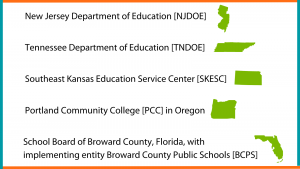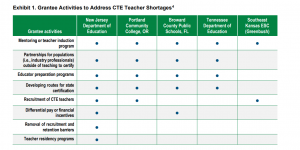Advance CTE and ECMC Foundation are excited to introduce the Fellows of the third cohort of The Postsecondary State Career Technical Education (CTE) Leaders Fellowship at Advance CTE—Sponsored by ECMC Foundation. The Advance CTE — ECMCF Fellows include representation across multiple demographic categories reflecting the Fellowship’s goal of intentionally building a postsecondary leadership pipeline for underserved populations in Career Technical Education (CTE) that closes racial representation gaps and removes equity barriers to postsecondary leadership advancement.
Over the next few days, this blog series will introduce each Fellow participating in the third cohort of emerging leaders from across 16 states and one U.S. territory.
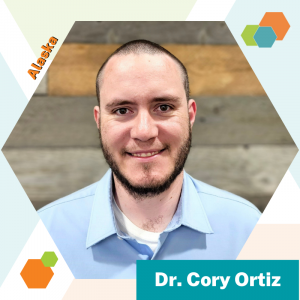 Dr. Cory Ortiz is the dean of the School of Career Education at the University of Alaska Southeast. In his current role, Dr. Ortiz is responsible for serving as the chief academic officer, overseeing Career Education faculty and staff, and providing guidance to the technical education programs in Juneau. His commitment extends beyond his campus, as he collaborates with campus directors in Ketchikan and Sitka to implement academic and workforce development programs. Before joining the University of Alaska Southeast, Dr. Ortiz served as an assistant professor of practice at Utah State University. His professional journey also includes K-12 work, where he served as a science, technology, engineering, and math (STEM) specialist, work-based learning coordinator, and engineering teacher. Dr. Ortiz’s qualifications include a Doctor of Philosophy (Ph.D.) with a major in Career and Technical Education, a Master of Science (MS), and a Bachelor of Science (BS), all from Utah State University.
Dr. Cory Ortiz is the dean of the School of Career Education at the University of Alaska Southeast. In his current role, Dr. Ortiz is responsible for serving as the chief academic officer, overseeing Career Education faculty and staff, and providing guidance to the technical education programs in Juneau. His commitment extends beyond his campus, as he collaborates with campus directors in Ketchikan and Sitka to implement academic and workforce development programs. Before joining the University of Alaska Southeast, Dr. Ortiz served as an assistant professor of practice at Utah State University. His professional journey also includes K-12 work, where he served as a science, technology, engineering, and math (STEM) specialist, work-based learning coordinator, and engineering teacher. Dr. Ortiz’s qualifications include a Doctor of Philosophy (Ph.D.) with a major in Career and Technical Education, a Master of Science (MS), and a Bachelor of Science (BS), all from Utah State University.
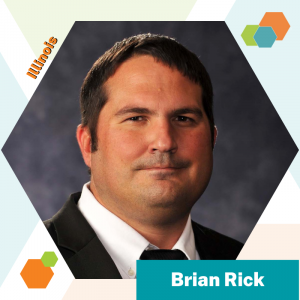 Brian Rick has been interested in the trades and the CTE field since an early age. He has worked in several high schools as well as local community colleges in both teaching and CTE administrator roles. Brian originally worked in the architecture and construction industry before coaching high school students which allowed him to find his passion and enter the education field. Brian is currently working for the CTE Projects Team at Northern Illinois University which develops new trainings, resources, and materials for CTE Teachers across the state in collaboration with the Illinois State Board of Education. Brian is passionate about helping new teachers coming from industry to education as well as work-based learning. Brian was also an Association for Career and Technical Education (ACTE) NextLevel leadership fellow (Cohort 3). When he is not working, he enjoys spending time traveling and at home with his wife and two kids who are five and eight years old.
Brian Rick has been interested in the trades and the CTE field since an early age. He has worked in several high schools as well as local community colleges in both teaching and CTE administrator roles. Brian originally worked in the architecture and construction industry before coaching high school students which allowed him to find his passion and enter the education field. Brian is currently working for the CTE Projects Team at Northern Illinois University which develops new trainings, resources, and materials for CTE Teachers across the state in collaboration with the Illinois State Board of Education. Brian is passionate about helping new teachers coming from industry to education as well as work-based learning. Brian was also an Association for Career and Technical Education (ACTE) NextLevel leadership fellow (Cohort 3). When he is not working, he enjoys spending time traveling and at home with his wife and two kids who are five and eight years old.
 Dr. Sara Shaw is currently a lecturer in the Career and Workforce Program at the University of Central Florida. She teaches, conducts research, and actively engages in service within the university and the field. Her research interests encompass female leadership in postsecondary education, current issues in career and technical education, and workforce equity. Dr. Shaw earned her doctorate in curriculum and instruction with a focus on career, technical, and postsecondary education from the University of Nevada, Las Vegas. In 2019, she was named an NC State Postsecondary Research Fellow, sponsored by the ECMC Foundation, to advance postsecondary CTE research. Additionally, she has been a recipient of ECMC’s mini-grants.
Dr. Sara Shaw is currently a lecturer in the Career and Workforce Program at the University of Central Florida. She teaches, conducts research, and actively engages in service within the university and the field. Her research interests encompass female leadership in postsecondary education, current issues in career and technical education, and workforce equity. Dr. Shaw earned her doctorate in curriculum and instruction with a focus on career, technical, and postsecondary education from the University of Nevada, Las Vegas. In 2019, she was named an NC State Postsecondary Research Fellow, sponsored by the ECMC Foundation, to advance postsecondary CTE research. Additionally, she has been a recipient of ECMC’s mini-grants.
 Dr. Shelanda Simmons serves as an educator within the Business Department at Tennessee College of Applied Technology, where she specializes in instructing administrative office technology. Her academic background includes the attainment of a BBA and MBA from Belhaven University, as well as the successful completion of a doctorate degree in education leadership with a concentration in policy from the University of Memphis.
Dr. Shelanda Simmons serves as an educator within the Business Department at Tennessee College of Applied Technology, where she specializes in instructing administrative office technology. Her academic background includes the attainment of a BBA and MBA from Belhaven University, as well as the successful completion of a doctorate degree in education leadership with a concentration in policy from the University of Memphis.
 Yingfah Thao has over 20 years of experience in higher education in a variety of roles focused on access and opportunity for low-income, marginalized communities.She is currently the director of professional development for career and technical education for Minnesota State Colleges and Universities, the third largest system of colleges and universities in the United States. She earned a bachelor’s degree in international relations with a minor in ethnic studies from Minnesota State University, Mankato, a master’s degree in technical communication, and a graduate certification in user experience (UX) design from Metropolitan State University.
Yingfah Thao has over 20 years of experience in higher education in a variety of roles focused on access and opportunity for low-income, marginalized communities.She is currently the director of professional development for career and technical education for Minnesota State Colleges and Universities, the third largest system of colleges and universities in the United States. She earned a bachelor’s degree in international relations with a minor in ethnic studies from Minnesota State University, Mankato, a master’s degree in technical communication, and a graduate certification in user experience (UX) design from Metropolitan State University.
To learn more about the Fellowship, the Fellows of Cohort 3, and the alumni of the Fellowship, please visit https://careertech.org/what-we-do/initiatives/postsecondary-state-cte-leaders-fellowship/


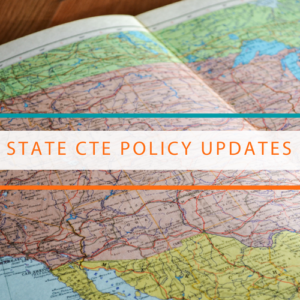 As the new year unfolds, 38 governors across the nation have delivered their much-anticipated
As the new year unfolds, 38 governors across the nation have delivered their much-anticipated  For further insights and resources connected to workforce development, check out our Learning that Works Resource Center.
For further insights and resources connected to workforce development, check out our Learning that Works Resource Center.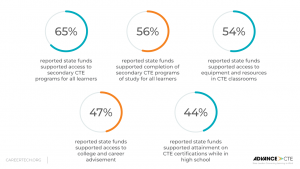

 A former Business and Marketing teacher Candi Collier has been in the world of Career Technical Education (CTE) for 22 years. After serving six years at the Tennessee Department of Education, Candi went back to the field to serve as the CTE Director of Milan Special School District in Milan, Tennessee.
A former Business and Marketing teacher Candi Collier has been in the world of Career Technical Education (CTE) for 22 years. After serving six years at the Tennessee Department of Education, Candi went back to the field to serve as the CTE Director of Milan Special School District in Milan, Tennessee. 
 Overall, micro-credential earners interviewed for this study perceived their experiences favorably and believed that efforts to earn such credentials would result in economic mobility through higher education and income levels. Earners indicated that micro-credentials allowed for more timely feedback and that each credential motivated earners to continue their progression. While stakeholders remain optimistic about the value of micro-credentials, many earners are still unsure of how earning micro-credentials may or may not impact their long-term employment trajectories.
Overall, micro-credential earners interviewed for this study perceived their experiences favorably and believed that efforts to earn such credentials would result in economic mobility through higher education and income levels. Earners indicated that micro-credentials allowed for more timely feedback and that each credential motivated earners to continue their progression. While stakeholders remain optimistic about the value of micro-credentials, many earners are still unsure of how earning micro-credentials may or may not impact their long-term employment trajectories.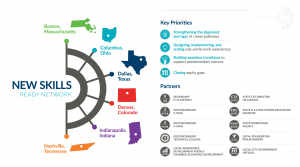
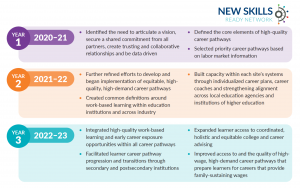
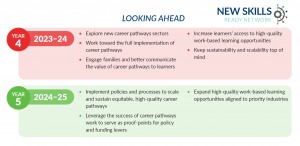

 As part of ongoing blog topics providing updates on this initiative, Deshaun Mars, Vice President, Global Philanthropy (Job Skills,) and Brice Thomas, Policy Associate engaged in a discussion to highlight JPMC’s view of the initiative and how this work advances JPMC’s philanthropic portfolio and ultimately building high-quality local and state career pathway systems.
As part of ongoing blog topics providing updates on this initiative, Deshaun Mars, Vice President, Global Philanthropy (Job Skills,) and Brice Thomas, Policy Associate engaged in a discussion to highlight JPMC’s view of the initiative and how this work advances JPMC’s philanthropic portfolio and ultimately building high-quality local and state career pathway systems. 